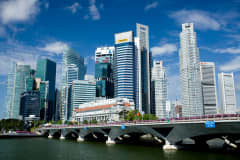Property Launches & Investments
This is some blog description about this site
If This Happens, Singapore Home Prices Will Fall
- Font size: Larger Smaller
- Hits: 6349
- 0 Comments
- Subscribe to this entry
- Bookmark
While Singapore's trade dependent economy has had a tough 2012, even teetering on the brink of a recession earlier this year, the city state's residential property market has remained robust, with prices among the highest in the world.
Private home prices in this Southeast Asian financial hub have risen a whopping 56 percent since the global financial crisis, and most analysts expect this upward trajectory to continue into the new year, even as the market faces a drop in sales volumes amid a somber growth outlook.
Singapore's private housing market has seen months of double-digit declines in sales, including a 44 percent month-on-month fall in November, in part due to a number of cooling measures introduced by the government – yet prices have remained firm.
Private property prices rose 0.5 percent in the three months to September, from the previous quarter when they gained 0.4 percent, according to the city's Urban Redevelopment Authority's (URA). This after a 5.7 percent year on year gain in 2011.
So what will it take for Singapore property prices to fall?
Michael Wan, research analyst at Credit Suisse has come up with two scenarios that could possibly give Singapore property prices a jolt - higher interest rates and a deep slump in economic growth.
Interest Rate Shock
One of the major factors fueling demand for property in Singapore is low interest rates. The Singapore Interbank Offered Rate (SIBOR), a benchmark rate for home loans, which tracks the United States Federal Reserve's funds rate, is near record lows at 0.4 percent.
Wan estimates that a sustained rise in SIBOR to 7 percent over the next five years would cause prices to decline by a cumulative 14 percent during that period.
The last time interest rates were above the 7 percent level was prior to the Asian Financial Crisis in 1998, when SIBOR touched 7.75 percent, according to Credit Suisse.
"To see a return to such a high rate would probably require either a huge positive growth shock (in the U.S.) and/or a very sharp pick-up in inflation in the U.S. economy," Wan said in a recent report.
The U.S. Federal Reserve has pledged to keep interest rates near zero until the country's jobless rate eases to 6.5 percent and inflation tops 2.5 percent, which is expected in 2015. The labor market has started to show signs of improvement in recent months, with the unemployment rate falling to 7.7 percent in November from 7.9 percent in October.
Growth Shock
Other than an interest rate shock, a "growth shock" would also impact home prices negatively.
According to Wan if Singapore's economy grows just 0.4 percent to 0.5 percent per annum over the next five years, this would cut property prices by 16 percent. Singapore's economy likely grew 1.5 percent in 2012 and is forecast to grow 2.7 percent in 2013, according to a recent survey by the Monetary Authority of Singapore.
While this scenario is unlikely, it is not entirely impossible, said Wan, "given our previous estimate that a full-blown euro zone breakup would cause Singapore's gross domestic product to contract by more than 9 percent."
Singapore has close financial and trade links with Europe, with exports to the region making up about 12 percent of the country's gross domestic product.
While risks around the euro zone debt situation have subsided in recent weeks, after the International Monetary Fund and the region's finance ministers reached an agreement on a bailout for Greece, economic conditions in the region remain fragile.
While those who want home prices to fall mull the possibility of the above two scenarios, Wan says the most likely case is that growth will average 2-3 percent per year over the next five years, and interest rates will remain at record lows until 2015, after which they will rise 2 percentage points by 2017. This means property prices will, in fact, gain 8 percent by 2017, he said.
Source: CNBC

